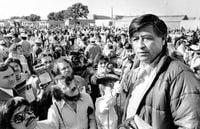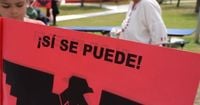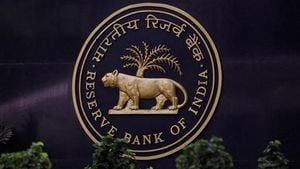DENVER (KDVR) — March 31 is a significant date in the United States, marking both the birthday of Cesar Chavez and the annual observance of Cesar Chavez Day. This day, celebrated with a mix of reflection and festivity, honors the legacy of the renowned civil rights and labor leader who dedicated his life to advocating for the rights of farm workers. In Denver, city offices will be closed in recognition of Chavez's contributions to the labor movement, a practice that reflects his lasting impact on American society.
Cesar Chavez Day was officially proclaimed a federal commemorative holiday by President Barack Obama in 2014. This recognition underscores the importance of Chavez’s work, which began in earnest when he co-founded the National Farm Workers Association in 1962, an organization that later evolved into the United Farm Workers. Chavez’s innovative strategies, including boycotts, marches, and strikes, were pivotal in rallying support for farm labor unions across the country.
Born on March 31, 1927, in Arizona, Chavez's early life was marked by hardship, including the challenges faced by his family as migrant workers. His experiences fueled his passion for social justice and labor rights. After serving in the U.S. Navy during World War II, he returned home determined to fight for equality and better working conditions for farm laborers alongside fellow activist Dolores Huerta. Together, they popularized the phrase “Si, se puede,” meaning “Yes, it can be done,” which became a rallying cry for their nonviolent movement.
On Monday, March 31, 2025, most offices in Denver, including libraries, courts, and motor vehicle registration offices, will be closed in observance of the holiday. While street meters will be free, residents are reminded that time restrictions still apply. Trash, recycling, and compost collection will continue as scheduled.
In Texas, where Chavez's influence was also profoundly felt, several counties will observe the holiday by closing their offices. Tarrant County and Dallas County, for instance, will be closed on this day. Dallas County recently voted to start observing Cesar Chavez Day as an official county holiday, reflecting the growing recognition of Chavez’s contributions to labor rights. Grand Prairie has also joined in, officially recognizing the Cesar Chavez/Dolores Huerta Day, with plans for commemorative festivities starting this year.
The significance of Chavez Day extends beyond government offices; it is also celebrated with community events. On March 29, just two days before the official holiday, the 24th Annual Cesar Chavez March and Rally took place in Corpus Christi, Texas. The event featured lively mariachi music, delicious food, and activities for families, creating a vibrant atmosphere to honor Chavez’s legacy.
Local leaders, including Nancy Vera, President of the Corpus Christi American Federation of Teachers, participated in the march, emphasizing the importance of labor and education. "In times where we are unsure of our futures, today we celebrate the certainty of labor in our community, the certainty of children, and telling our children that we’re here for you, you’re our future, and we are going to educate you so that you can be successful in your lives," Vera stated. This sentiment echoes the broader purpose of Chavez Day, which serves as a reminder of the power of unity and collective action.
Cesar Chavez’s legacy is not only commemorated through holidays and events but also through the ongoing fight for workers' rights. His efforts to unionize farm laborers and improve their wages and working conditions have inspired generations of activists. The march in Corpus Christi, like many others across the country, serves as both a celebration of past achievements and a call to action for the future.
In addition to the marches and rallies, cities across Texas have made efforts to honor Chavez’s contributions in more permanent ways. For example, Austin changed the name of East 1st Street to Cesar Chavez Street in 1993, and Dallas renamed a section of South Central Expressway after him in 2010. These changes reflect a recognition of Chavez’s impact not only in the labor movement but also in the cultural landscape of Texas.
As communities gather to celebrate Chavez Day, they reflect on the progress made in labor rights while acknowledging the work that still lies ahead. The spirit of Chavez’s activism continues to inspire advocates for social justice, equality, and workers’ rights across the nation. Events like the Cesar Chavez March and Rally are crucial in keeping his legacy alive, reminding participants of the sacrifices made for justice and the importance of standing up for those rights.
Chavez passed away in 1993, but his influence remains strong. In 1994, he was posthumously awarded the Presidential Medal of Freedom, the nation’s highest civilian honor, solidifying his place in American history. As more people learn about his life and contributions, the hope is that his message of nonviolent resistance and community solidarity will continue to resonate.
This year, as cities and communities across the United States observe Cesar Chavez Day, it is a time for reflection, celebration, and a recommitment to the ideals that Chavez championed throughout his life. Whether through local events, educational initiatives, or community service, the legacy of Cesar Chavez lives on, inspiring new generations to advocate for justice and equality in the labor movement and beyond.






